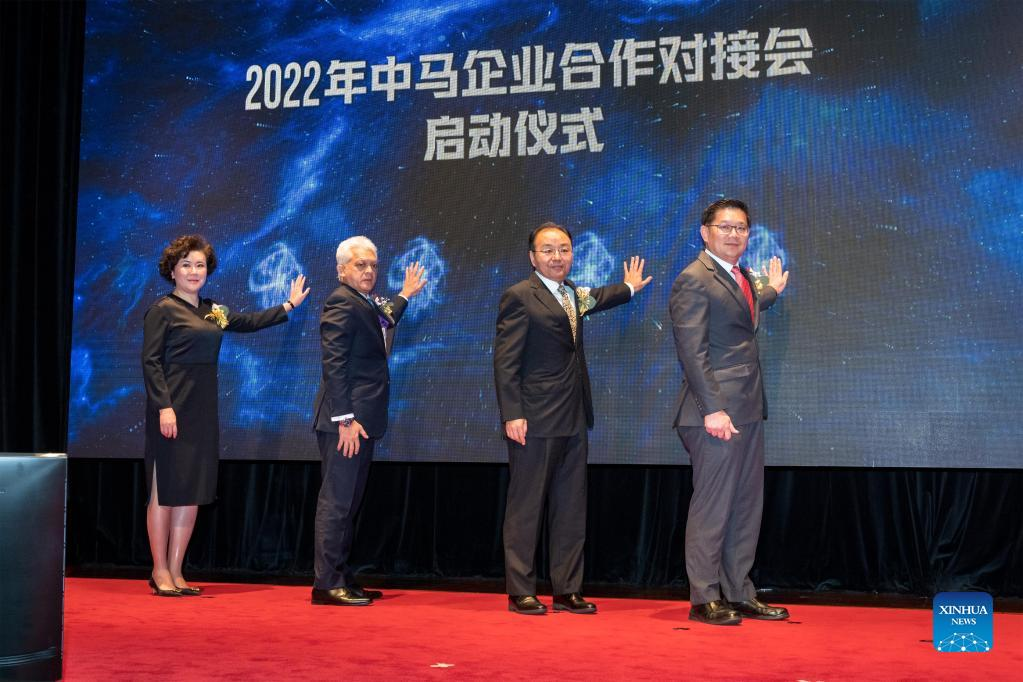
Malaysian International Trade and Industry Deputy Minister Lim Ban Hong (1st R) and Chinese Ambassador to Malaysia Ouyang Yujing (2nd R) attend the launching ceremony of the "4th Malaysia-China B2B Business Matching Session" held in Kuala Lumpur, Malaysia, Sept. 13, 2022. (Photo by Chong Voon Chung/Xinhua)
KUALA LUMPUR, Sept. 13 (Xinhua) -- Bilateral trade between China and Malaysia is expected to boom as the Regional Comprehensive Economic Partnership (RCEP) will streamline and harmonize various aspects of the business relationship between the two countries, a Malaysian official said on Tuesday.
In his keynote address at the launching ceremony of the "4th Malaysia-China B2B Business Matching Session" being held in conjunction with the upcoming 19th China-ASEAN Expo (CAEXPO), Malaysian International Trade and Industry Deputy Minister Lim Ban Hong said RCEP will create a more transparent, specific, rules-based framework for trade and investment.
The upcoming CAEXPO, which is scheduled for Sept. 16-19 in Nanning, China, features the theme of "Sharing RCEP New Opportunities, Building a Version 3.0 China-ASEAN FTA".
"The harmonization of tariff concessions under RCEP will directly give a boost to trade and enhance regional integration in the region. It also provides opportunities for exporters to expand and diversify the outreach of their goods and services into more markets," he said.
"It will also strengthen the integration of companies in the global value and regional supply chain notably between Malaysia and China as well," he said.
Lim also said RCEP provides a strategic platform for businesses to collaborate and this will allow closer economic integration through lower tariffs, stronger logistics connectivity, and a more robust trade ecosystem in the region.
"Malaysia stands to greatly benefit from the larger market integration. As we are strategically located at the heart of this region, the reduced trade barriers and better trade facilitation will further enhance market access to other countries with lower costs for businesses," he said.
For his part, Chinese Ambassador to Malaysia Ouyang Yujing said China and Malaysia have achieved a quantum leap in their relationship and are at the forefront of other ASEAN countries.
"China-Malaysia relationship is a lively illustration of the development of China-ASEAN relationship. Under the joint promotion of China, ASEAN countries and other parties, RCEP came into effect on Jan. 1, 2022 as scheduled, and China-Malaysia economic and trade cooperation has been further deepened and developed," he said.
"Both countries have achieved fruitful results in the cooperation of industrial parks, infrastructure, equipment manufacturing, information and communications, digital economy and other fields," he added.
In his remarks, Mohd Mustafa Abdul Aziz, chief executive officer of the Malaysia External Trade Development Corporation (MATRADE), said that the close and energetic trading relationship between Malaysia and China has been a positive driving force in not only post-pandemic recovery efforts but also Malaysia's digital transformation.
"I believe the friendly relationship between Malaysia and China is not just maintaining the momentum but further driving the trajectory of strong and vibrant economic ties between our two countries," he said.
Since the beginning of the COVID-19 pandemic, digitalization has become one of the important elements in competitiveness for business communities. The pandemic has accelerated the need for everyone to embrace and adopt digitalization in various aspects, he noted. ■



